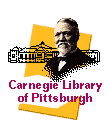Funding and Governance

The Carnegie Library of Pittsburgh is part of the larger Carnegie Complex, which also includes a concert hall and two museums. All are housed in imposing, 100-year-old stone structures set next to colleges and universities in the Oakland section of the city. Although the association with the Carnegie Complex suggests a picture of strength and solidarity, the facts are different: unlike the museums, the library has no large endowment. As a public trust, the library had depended on city and county tax dollars that have fluctuated with the politics and economy of the area. During its first 50 years, the library was financed entirely by the city; in the second 50 years, it expanded its support base to include funds from the county.
In 1986, the president and CEO of the Carnegie complex, Robert Wilburn, who also serves as president of the library board, called for a study to examine the library’s tenuous financial situation and to communicate the need for new directions in the future. The city and county were involved in the study, as were traditional library supporters. In addition, each branch library had its own study group, each of which has evolved since to become a Friends of the Library group. The resulting document, Report of the President’s Advisory Committee on the Library (April 1990) incorporated many community interests and concluded that the Carnegie Library of Pittsburgh was seriously underfunded and required an additional three million dollars per year to meet the basic needs of the system. It also concluded that library services in Allegheny County were unevenly distributed and poorly funded.
In 1991, Frank Lucchino, controller of Allegheny County, wrote a persuasive report, The Quiet Crisis: Libraries in Allegheny County, describing the then seriously inadequate level of support to the libraries and uneven quality of services provided across the county. In response to recommendations from this and the 1990 president’s report, a state law was passed that mandated funding for all libraries (and other cultural programs) in Allegheny County, including the Carnegie Library of Pittsburgh, through a one percent sales tax administered at the county level by a newly created body, the Regional Asset District Board. The Carnegie Library of Pittsburgh receives about four million dollars annually of the 110 million dollars collected. This stable revenue stream supports the main library and its branches and assures equitable library services to all residents. The move to county-wide tax support was a timely one, since the city recently has cut back its financial support.
Today, the library is working to enlarge a modest endowment with a broader, more solid regional financial base, and it has received ten million dollars in private foundation funding to support a three-year program of regional library electronic network development.
The library’s tradition is strong as a free institution. There have never been fees, except for a nickel-per-day overdue fee (with periods of amnesty). Even with the advent of printers connected to public access work stations in the main library, there are no fees for using printers or for paper. The tradition of fee-free services has implications in an increasingly technology-rich environment. For example, librarians report that one patron has printed more than 1,000 pages of song lyrics off the Internet at no charge.
In 1995, the Board of Trustees was expanded from eight life appointments and ten ex officio elected officials to include an additional 12 citizens actively concerned about library services. Newcomers to the board include representatives of the Urban League and the Friends of the Library groups. The terms of these new officials are three years. The new board, says director Croneberger, is proactive and strongly supports innovation. He believes it is the first board to pass the “access to electronic information” policy of the American Library Association that calls for unfettered access to information in a non-judgmental environment.

